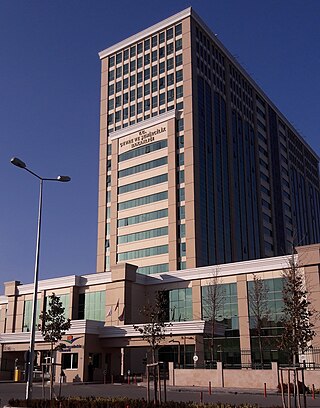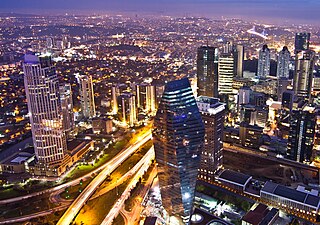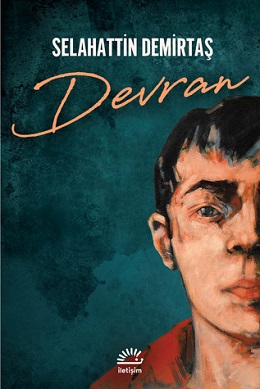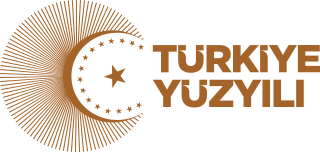Related Research Articles

The lira is the official currency of Turkey and Northern Cyprus. One lira is divided into one hundred kuruş.

General elections were held in Turkey on Sunday 24 December 1995, triggered by the newly re-established Republican People's Party's (CHP) withdrawal from a coalition government with the True Path Party (DYP). The coalition had been in government for four years, having been formed by the Social Democratic Populist Party, the CHP's predecessor.

Devlet Bahçeli is a Turkish politician, economist, former deputy prime minister, and current chairman of the far-right, ultranationalist Nationalist Movement Party (MHP).

The Ministry of Environment, Urbanisation and Climate Change is a government ministry of the Republic of Turkey, responsible for the environment, public works, and urban planning in Turkey. The ministry is headed by Mehmet Özhaseki.

Mehmet Şimşek is a Turkish politician and economist, who has served as the Minister of Treasury and Finance since 3 June 2023. He was the Deputy Prime Minister of Turkey from 24 November 2015 until the office's abolition on 9 July 2018. He previously served as the Minister of Finance from 2009 to 2015, in the cabinets of Prime Ministers of Recep Tayyip Erdoğan and Ahmet Davutoğlu. As a member of the Justice and Development Party, he was elected as a Member of Parliament for Gaziantep in the 2007 general election and for Batman in the 2011 general election.

The Turkish construction and contracting industry is a big part of the economy: but it has been accused of poor quality due to corruption, causing many deaths in earthquakes.

Agriculture is an important sector of Turkey's economy, and the country is one of the world's top ten agricultural producers. Wheat, sugar beet, milk, poultry, cotton, vegetables and fruit are major crops; and Turkey is the world's largest grower of hazelnuts, apricots, and oregano.

Indonesia and Turkey established diplomatic relations in 1950. Diplomatic relations are particularly important because both are Muslim-majority countries as well as modern democracies. Indonesia has an embassy in Ankara and consulate-general in Istanbul. Turkey has an embassy in Jakarta, and honorary consulate in Medan since May 1996. Both countries are full members of the World Trade Organization (WTO), Organisation of Islamic Cooperation (OIC), D-8 Organization for Economic Cooperation, MIKTA and the G-20 major economies.

The Turkish economic crisis is an ongoing financial and economic crisis in Turkey. It is characterized by the Turkish lira (TRY) plunging in value, high inflation, rising borrowing costs, and correspondingly rising loan defaults. The crisis was caused by the Turkish economy's excessive current account deficit and large amounts of private foreign-currency denominated debt, in combination with President Recep Tayyip Erdoğan's increasing authoritarianism and his unorthodox ideas about interest rate policy. Some analysts also stress the leveraging effects of the geopolitical frictions with the United States. Following the detention of American pastor Andrew Brunson, who was confined of espionage charges after the failed 2016 Turkish coup d'état attempt, the Trump administration exerted pressure towards Turkey by imposing further sanctions. The economic sanctions therefore doubled the tariffs on Turkey, as imported steel rises up to 50% and on aluminum to 20%. As a result, Turkish steel was priced out of the US market, which previously amounted to 13% of Turkey's total steel exports.

Devran is a book authored by the Kurdish politician Selahattin Demirtaş while he was in prison in Edirne, Turkey. In the book are included fourteen short stories, which focus on human rights of Kurds in Turkey. After Dawn, it is the second book of Demirtaş and was published in 2019 by İletişim Yayınları. It has a dedication to his parents who stood by their children for seventeen years while they were prosecuted or in prison.

Şahap Kavcıoğlu is a Turkish banker and politician. He was a Member of the Grand National Assembly of Turkey for the Justice and Development Party (AKP) and was the Governor of the Central Bank of the Republic of Turkey from 2021 to 2023. He is also a contributor to the newspaper Yeni Safak and is described as a supporter of the economic policies of Recep Tayyip Erdoğan.
The People's Democratic Party closure case refers to a legal procedure during which the Peoples' Democratic Party (HDP) is threatened with closure while hundreds of its politicians facing a political ban for five years. The HDP was accused to have organizational ties with the Kurdistan Workers' Party (PKK).
Sezgin Baran Korkmaz is a Turkish businessman and chairman of the SBK holding. In June 2021, he was arrested in Austria on request of a court in the United States.
Semra Güzel is a medical doctor, a politician and member of the Peoples' Democratic Party (HDP). She was a member of the Grand National Assembly of Turkey until her dismissal in December 2022.

Presidential elections were held in Turkey in May 2023, alongside parliamentary elections, to elect a president for a term of five years. It marks the first time a Turkish presidential election has gone to a run-off. The election had originally been scheduled to take place on 18 June, but the government moved them forward by a month to avoid coinciding with the university exams, the Hajj pilgrimage and the start of the summer holidays. It is estimated that a total of 64 million voters had the right to cast their votes in elections, 60.9 million in Turkey and 3.2 million abroad.

Turkish president Recep Tayyip Erdoğan began his candidate for the Presidential elections 2023 in April 2022. Erdoğan was the candidate of the People's Alliance consisting of the Justice and Development Party (AKP) and the Nationalist Movement Party (MHP). Erdogan and his rival Kemal Kılıçdaroğlu both failed to secure a majority in the first round on 14 May and the election went to a run-off for the first time in Turkish history. On 28 May Erdogan won the election securing 52.18 percent of the vote and claimed victory after 99.4% of the votes were counted in the second round as the Supreme Election Council declared Erdoğan as mathematically elected.
Individuals and events related to 2023 in Turkey.

On 6 February 2023, at 04:17 TRT (01:17 UTC), a Mw 7.8 earthquake struck southern and central Turkey and northern and western Syria. The epicenter was 37 km (23 mi) west–northwest of Gaziantep. The earthquake had a maximum Mercalli intensity of XII (Extreme) around the epicenter and in Antakya. It was followed by a Mw 7.7 earthquake at 13:24. This earthquake was centered 95 km (59 mi) north-northeast from the first. There was widespread damage and tens of thousands of fatalities.
On the 25 February 2023, a football match of the Turkish Süper Lig between Fenerbahçe and Konyaspor took place in the Şükrü Saracoğlu Stadium in Istanbul, Turkey. The match ended in a 4–0 victory for Fenerbahce and during the match, fans chanted slogans against the Turkish Government demanding it to resign. Enner Valencia scored two goals in a match in which Konyaspor had to play with 10 players after Mame Biram Diouf was shown the red card in minute 22 in the first half.

Kemal Kılıçdaroğlu, leader of the Republican People's Party and İzmir deputy, became the joint presidential candidate of the Nation Alliance for the 2023 Turkish presidential election. He held a narrow lead in most poll aggregations, but nevertheless lost to incumbent President Recep Tayyip Erdoğan.
References
- 1 2 3 "Special communication tax increased 33 percent - Latest News". Hürriyet Daily News. Retrieved 2023-02-10.
- ↑ Baysan, Lauren Said-Moorhouse,Isil Sariyuce,Zeena Saifi,Reyhan (2023-02-08). "Emotions run high in Turkey amid questions over state response to deadly quake". CNN. Retrieved 2023-02-10.
- ↑ "Situation Report 13: Duzce Earthquake, Turkey - Türkiye | ReliefWeb". reliefweb.int. Retrieved 2023-02-10.
- ↑ "Turkey quakes to cost nation $6.2 billion - Minister - Türkiye | ReliefWeb". reliefweb.int. Retrieved 2023-02-10.
- 1 2 3 "24 Billion TL "Earthquake Taxes" Used Elsewhere". Bianet . 2009.
- 1 2 3 4 Sönmez, Mustafa. "Turks question 'quake taxes' after deadly tremor - Al-Monitor: Independent, trusted coverage of the Middle East". Al-Monitor . Retrieved 2023-02-11.
- 1 2 3 "Erdogan zwackte Steuergeld ab, statt Häuser gegen Erdbeben zu sichern". Focus . 8 February 2023.
- ↑ "Turkey Increases Special Communication Tax Rate — Orbitax Tax News & Alerts". www.orbitax.com. Retrieved 2023-02-11.
- ↑ "Turkey's president faces scrutiny after earthquake for construction standards". PBS NewsHour. 2023-02-16. Retrieved 2023-02-18.
- ↑ Nawaz, Amna (2023-02-16). "Turkey's president faces scrutiny after earthquake for construction standards". PBS NewsHour. Retrieved 2023-02-18.
- ↑ "CHP MP: What Has the Earthquake Tax been Spent For?". Bianet . 2019.
- 1 2 3 4 "Erdbebensteuer der Türkei zweckentfremdet: Heftige Kritik an Erdogan nach Katastrophe mit tausenden Toten". Frankfurter Rundschau (in German). Retrieved 2023-02-11.
- ↑ Algedik, Önder (2020-03-11). "What happened to the earthquake special taxes in Turkey?". Gazete Duvar (in Turkish). Retrieved 2023-02-10.
- ↑ "Turkey earthquake: Erdogan 'responsible for this' opposition leader says". BBC News. 2023-02-08. Retrieved 2023-02-13.